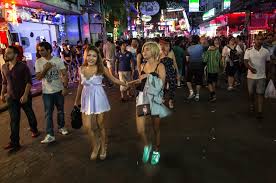
Tension: Party representatives argue over the vote count at a collation centre at Port Harcourt, Nigeria’s oil hub
Nigeria’s main opposition on Monday accused the ruling party of trying to rig presidential elections as the incumbent cemented a lead, but monitors voiced concern about polling day problems and violence that caused dozens of deaths.
The Peoples Democratic Party (PDP) accused the All Progressives Congress (APC) of President Muhammadu Buhari of colluding with the electoral commission in an attempt to “manipulate the results”.
PDP chairman Uche Secondus told reporters the APC was using security agencies and ministers to put pressure on the authorities. “It’s as if we are in the military era,” he added.
The accusation, rejected by the APC as a “childish” attempt to discredit the commission and the process, came as Buhari – a former military ruler – took an early lead when first results were announced.
With 10 states declared, Buhari was ahead by seven states to three, with 2,831,572 votes to the 2,076,490 for the former vice-president, Atiku Abubakar, of the PDP.
To win, a candidate needs a majority of votes and at least 25 percent of support in two-thirds of Nigeria’s 36 states and the Federal Capital Territory of Abuja.
A total of 72.7 million people were eligible to vote in the presidential poll as well as parliamentary elections held at the same time.

Rivals: Buhari, left, and Abubakar
The election – the sixth in the 20 years since Nigeria returned to democracy after decades of military rule – took place on Saturday, a week after a last-gasp postponement.
The Independent National Electoral Commission (INEC) blamed logistical difficulties, which were not entirely ironed out by the weekend, forcing voting to go into a second day.
– ‘Serious shortcomings’ –
The European Union said there were “serious operational shortcomings”, which saw polling units open late, leaving voters waiting for hours with no idea when voting would start.
The Situation Room umbrella group of over 70 civil society organisations observing the vote called for an inquiry into what it said was INEC’s “poor management” of the process.
It highlighted lapses in logistics, technology and security and said INEC had “not managed the election efficiently and significant shortcomings have been recorded”.
“The election has been a step back from the 2015 General Election and actions should be taken to identify what has gone wrong and what can be corrected,” it added.
The head of the African Union observer mission, Ethiopia’s former prime minister Hailemariam Desalegn, also said they were concerned “by the pattern of consistent postponement”.

Wait: Voters queue at a polling station in Malkohi refugee camp in Adamawa state — a facility for people displaced by the Boko Haram jihadist insurgency
The last two elections suffered similar delays and Hailemariam said the latest postponement had “implications for citizens’ participation and turnout”.
“Last-minute election postponements should not become the norm in Nigeria,” added the National Democratic Institute and International Republican Institute.
Monitors Yiaga Africa said early indications put voter turnout at 36-40 percent.
In the southeast state of Abia, where pro-Biafran separatist leaders had urged supporters to boycott the vote, turnout was just 18 percent.
– Security gaps –
The election took place against a backdrop of fears about security across the country, as well as claims from both parties that the other was looking to rig the result.
Neither produced evidence but INEC chairman Mahmood Yakubu on Sunday said there were reports of ballot-snatching, vote-buying and violence.
One election volunteer was killed by a stray bullet in the southern state of Rivers, where some INEC staff and even police were held hostage before being released unharmed.

Key statistics on Nigeria
Other election staff were attacked in the southern state of Akwa Ibom and Kogi in the north central region.
The Situation Room, which had some 8,000 monitors on the ground, said “at least 39 Nigerians” were killed in election-related violence in 11 states on Saturday and Sunday.
Worst-affected was the oil-rich southern state of Rivers, where 16 people were killed.
Read Also: Breaking: Thugs set INEC office on fire
Previously, analysts SBM Intelligence said 233 people were killed in 67 incidents of election-related violence from last October to Friday – an average of two people per day.
The Situation Room highlighted reports that just over a quarter of the nearly 120,000 polling units were under-policed, and said there were “shortfalls and gaps” in security elsewhere.
At least six states saw disruption in polling. In the Okoto area of the country’s biggest city, Lagos, voters were chased away and ballot boxes were destroyed.
In Osun state, ballot papers and boxes were destroyed at the local INEC office.
There were also reports of some “partisan” security officials as well as “compromised” INEC staff and incidents involving the military, including blocking some voters.
Police said separately that 128 people had been arrested across the country for electoral offences, including murder, vote-buying and ballot box snatching.








